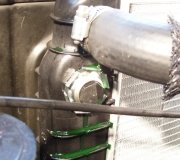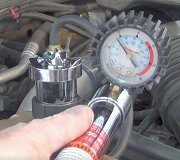You need to open it up and investigate properly-
A clicking or tapping noise that gets louder when you rev the engine is probably "tappet" or upper valvetrain noise caused by one of several things: low oil pressure, excessive valve lash, or worn or damaged parts.
First, check the engine dipstick to see if the oil level is low. If low, add oil to bring it back up to the full mark. Is the engine still noisy? Check your oil pressure. A low gauge reading (or oil warning light) would indicate a serious internal engine problem that is preventing normal oil pressure from reaching the upper valvetrain components. The cause might be a worn or damaged oil pump, a clogged oil pump pickup screen or a plugged up oil filter. Using too thick a viscosity of motor oil during cold weather can also slow down the flow of oil to the upper valvetrain, causing noise and wear.
COLLAPSED LIFTER NOISE
Worn, leaky or dirty lifters can also cause valvetrain noise. If oil delivery is restricted to the lifters (plugged oil galley or low oil pressure), the lifters won't "pump up" to take up the normal slack in the valvetrain. A "collapsed" lifter will then allow excessive valve lash and noise.
VALVE LASH NOISE
If you can rule out lubrication-related problems as a cause, the next step would be to remove the valve cover(s) and check valve lash. On older import engines, mechanical lifters require periodic valve lash adjustments (typically every 30,000 miles). Too much space between the tips of the rocker arms and valve stems can make the valvetrain noisy -- and possibly cause accelerated wear of both parts.
To measure (and adjust) valve lash, you need a feeler gauge. The gauge is slid between the tip of the valve stem and rocker arm (or the cam follower or the cam itself on overhead cam engines) when the piston is at top dead center (valve fully closed). Refer to a manual for the specified lash and adjustment procedure. Also, note whether the lash spec is for a hot or cold engine (this makes a big difference!).
On engines with hydraulic lifters, oil pressure pumps up the lifters when the engine is running to maintain zero lash in the valvetrain. This results in quiet operation. So if the rocker arms are clattering, it tells you something is amiss (bad lifter or worn or damaged parts) or the rocker arms need adjusting.
Wednesday, March 26th, 2008 AT 6:22 AM


